 MyDogBreeds
MyDogBreeds Shepherd Husky is originated from United States but Lurcher is originated from United Kingdom. Shepherd Husky may grow 11 cm / 4 inches shorter than Lurcher. Shepherd Husky may weigh 8 kg / 18 pounds more than Lurcher. Both Shepherd Husky and Lurcher has almost same life span. Both Shepherd Husky and Lurcher has almost same litter size. Shepherd Husky requires Moderate maintenance. But Lurcher requires Low maintenance
Shepherd Husky is originated from United States but Lurcher is originated from United Kingdom. Shepherd Husky may grow 11 cm / 4 inches shorter than Lurcher. Shepherd Husky may weigh 8 kg / 18 pounds more than Lurcher. Both Shepherd Husky and Lurcher has almost same life span. Both Shepherd Husky and Lurcher has almost same litter size. Shepherd Husky requires Moderate maintenance. But Lurcher requires Low maintenance
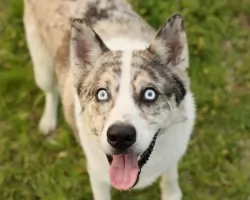 What a beautiful dog the Shepherd Husky is. He is a mix between the Husky and the German Shepherd. Other names for him include Gerberian Shepsky, German Husky and Siberian Shepherd.
What a beautiful dog the Shepherd Husky is. He is a mix between the Husky and the German Shepherd. Other names for him include Gerberian Shepsky, German Husky and Siberian Shepherd.
The German Shepherd originated in Germany and the Husky is from Siberia. We assume this mixed breed dog was bred in the USA. The true origin of the German Shepherd Husky dog is unclear but both the parent breeds have long histories.
The dog is recognized as a Hybrid by both the Dog Registry of America as well as the American canine hybrid Club.
 The Lurcher is a crossbreed dog that doesn’t seem to have too much certainty around it. There are stories that Lurchers may have been bred to produce a sighthound with more intelligence for hunting.
The Lurcher is a crossbreed dog that doesn’t seem to have too much certainty around it. There are stories that Lurchers may have been bred to produce a sighthound with more intelligence for hunting.
Hunters discovered that breeding certain breeds with sight-hounds produced a dog better suited for hunting and working purpose.
A Lurcher is a sighthound, a classic working crossbreed and some of the dogs used to bring about this breed were Greyhounds, Deerhounds, Whippets, Border Collies, Bedlington Terriers and Irish Wofhounds among others. This means that the Lurcher has many different looks as well. In the UK, Lurchers have their own shows, but no registry recognizes the dog.
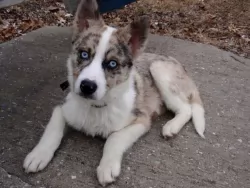 Solid and strong, the German Shepherd Husky mix is attractive. He is a fairly large dog standing at 51 to 64cm in height and weighing between 20 to 40kg.
Solid and strong, the German Shepherd Husky mix is attractive. He is a fairly large dog standing at 51 to 64cm in height and weighing between 20 to 40kg.
They’re powerful dogs these as they have a long history of being working dogs. The eyes of this beautiful dog can be brown, green or blue or a mix of these. The thick double coat protects them from the cold and in the warmer months, he sheds quite a bit.
The coat can be brown, black and tan or it can have creamy shades and be mixed with grey and white too.
The Shepherd Husky is a friendly, amicable dog who wants to please his owner. Training and socialization make him even more well adjusted. He is a dog that will get on well with children in the home as well as other dogs.
He is such an all rounder this dog – loyal, intelligent, social and loving - being great for accompanying you on walks and hikes but being willing to sit with you indoors too.
While he is adaptable and good natured and will happily live with his owner in the city or the countryside, he is better suited to life in the countryside. He also makes a great guard-dog.
 It is difficult to put a size and weight to the Lurcher, This is because of the many dogs used in his development, so that they vary in size and coat type. Generally though, he is a deep chested dog that stands roughly between 50 – 75cm and weighs 25 – 32kg.
It is difficult to put a size and weight to the Lurcher, This is because of the many dogs used in his development, so that they vary in size and coat type. Generally though, he is a deep chested dog that stands roughly between 50 – 75cm and weighs 25 – 32kg.
However, because Whippet was a dog used in his development, he could be as small as a Whippet, the size of a Greyhound or Deerhound.
Generally he has a shortish coat. Colours of the coat vary greatly so you can find fawn, cream, white, grey, black, tan, silver or grey and bi-colored. The ears are usually small and can be floppy or held erect or back and the tail is usually long.
The Lurcher’s temperament is much like that of the sighthound – loving and calm. It is a good idea to have the Lurcher trained and socialized to help prevent both timidity or aggression.
He is an independent and intelligent dog and can be easily trained. He is a gentle dog and will get on well with children and pets in the home as he is a fairly relaxed breed with a quiet temperament, loving to spend time with his human family. Another advantage is that he is low maintenance and makes a great pet when shown love and care.
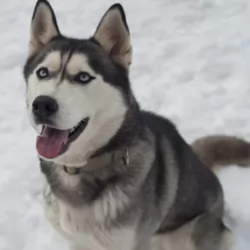 The German Shepherd Husky mix is such an ideal dog for single people, couples and families. This wolf-like breed is intelligent, loving,social and protective – the ideal family dog.
The German Shepherd Husky mix is such an ideal dog for single people, couples and families. This wolf-like breed is intelligent, loving,social and protective – the ideal family dog.
For those looking for an active dog that can be their jogging, walking and camping partner, this dog is for you. He loves to be busy, but he also loves being made a fuss of indoors too.
He has so many excellent qualities and is one dog breed that ticks all the right boxes for being such an all-round splendid pet and companion.
 The Lurcher is a working- and hunting dog that won’t do well in the city, as he requires large spaces to run.
The Lurcher is a working- and hunting dog that won’t do well in the city, as he requires large spaces to run.
He is a dog that will need you to provide him with games and other activities as well as a walk every day to keep him fit and lithe. He will therefore require an owner who loves to be active and who is consistent, firm, fair, patient and kind.
With the right human family, the Lurcher is a loving, devoted dog who will make an excellent family pet.
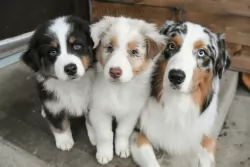 This is such a robust dog that you an scarcely think of him being sickly and yet there are some illnesses that are common to all dogs and which your German Shepherd Husky mix might get as well.
This is such a robust dog that you an scarcely think of him being sickly and yet there are some illnesses that are common to all dogs and which your German Shepherd Husky mix might get as well.
Hip dysplasia is common in German Shepherd dogs as well as arthritis and thyroid dysfunction. Bloat and cancer are other diseases to watch for.
Canine hip dysplasia is a genetic disease characterised as a disease of the hip. The malformation can lead to arthritis and pain and ultimately lead to the loss of hip function, crippling your dog.
You will need to get your pet to the vet for treatment to make his life more comfortable.
 Every dog has the potential to develop genetic health problems, but the way you feed a dog and look after it will play a huge role in his wellbeing.
Every dog has the potential to develop genetic health problems, but the way you feed a dog and look after it will play a huge role in his wellbeing.
Lurchers are looked upon as being a pretty healthy dog breed and they can be with you for between 10 and 15 years.
Some of the main health concerns with this dog would be bloat, ear- and eye infections or heatstroke.
Remember that if you’re getting a new puppy, you can prevent some of the major life-threatening diseases by having your puppy vaccinated.
Dogs pant heavily when they’re hot. When the panting isn’t enough, the dog’s body temperature rises and this can be fatal for your pet.
The signs of heatstroke in dogs include vomiting, diarrhea, dullness and loss of consciousness. Being locked in a hot car, being over-exercised or left in a yard without shade and water can bring on heatstroke.
It is imperative to remove the dog from the hot place immediately and cool him down by spraying cold water gently over him while making sure no water enters the mouth or nose. Get him to the vet if you can because of shock and the fact that other problems could have developed.
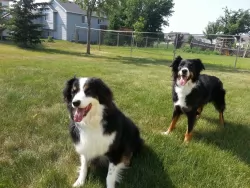 ◆Brush the coat of your Shepherd Husky twice a week to rid the coat of loose hairs. This dog’s hair sheds quite heavily as the weather warms and he may require brushing more often.
◆Brush the coat of your Shepherd Husky twice a week to rid the coat of loose hairs. This dog’s hair sheds quite heavily as the weather warms and he may require brushing more often.
◆When you brush him, check the ears and eyes for infection. The eyes must be bright and clear.
◆Feed your Shepherd Husky the best food there is as he is an energetic, working breed. The commercially manufactured foods can be a good, convenient choice but you need to make sure it is one of the better brands.
Some of the cheaper brands are full of bad ingredients that can make a dog sick.Try and give him some home-made foods that are healthy and nutritious. This food can be added to his dry kibble twice a week.
Boiled chicken, brown rice or pasta and spinach, sweet potatoes and carrots are a tasty healthy choice for your pet. Try and include some raw meat into the diet as well.
 Brush your pet’s coat at least twice a week.
Brush your pet’s coat at least twice a week.
The Lurcher just loves to run and be free, so this is a dog that will want a long walk every day.
Check his eyes and inside his ears for ear infection. Find out how to clean inside the ears and make sure they are kept dry.
Keep his nails clipped, as long nails can hook and cause painful injury to the paw area. Check his teeth too and brush them because dental disease is the root cause of many other diseases.
Make sure your dog has a comfy, dry, warm place to sleep.
Encourage health and longevity by giving your pet high quality food full of vitamins and minerals. If you’re going be giving him commercially manufactured food, make sure its one of the better ones. Try and add in homemade food such as boiled chicken, brown rice and vegetables and add this to his kibble as a tasty treat. Some raw meat added in when you can afford it will also be to his advantage.